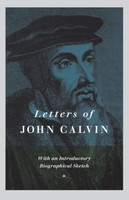
Calvin, John
Description
Long unavailable the republication of Calvin’s Tracts and Letterswill delight all who have come to delight in the writings of the sixteenth-century reformer of Geneva.
Three Volumes of Tracts
Three volumes of Tracts comprise some of Calvin’s most important writings. Volume 1 begins with the Life of Calvin written by his close friend and colleague, Theodore Beza. An outline of Calvin’s life and work by an eye-witness and intimate friend, it will never be entirely superseded by any other biography. There follows several miscellaneous Tracts relating to the reformation, which all have a strong bearing on the leading points at issue between Roman Catholics and Protestants. Among them is the famous exchange with Cardinal Sadaleto and The Necessity of Reforming the Church.
The Tracts contained in the second volume discuss subjects which are of the highest importance in themselves. They range widely over a very extensive field, presenting us both with general summaries of the Truth, in its most elementary form (Calvin’s Catechism, etc.), and also with learned and profound treatments of more difficult points, particularly the nature of our Saviour’s Presence in the Supper.
The four Tracts that comprise the third volume, were selected partly on account of their own intrinsic value, and partly on account of the additional interest which recent controversies have given to some of the subjects considered in them. They contain lucid discussions on all the leading points in the controversy with Rome, furnish wholesome advice in answer to a question which once was, and will probably again become, of great practical importance (The True Method of Reforming the Church and Healing Her Divisions); and refute the wild dogma which a kind of infidel fanaticism had devised, asserting, that in the interval between death and the final judgment the soul remains in a state of sleep or unconscious existence.
All the Tracts sustain the reputation of their distinguished author; and, considering their controversial nature, do not often display the virulent spirit and intemperate language for which modern critics all too often condemn Calvin.
Four Volumes of Letters
The man who regularly lectured to theological students, preached on average five times a week and authored enough material to fill forty-eight enormous volumes could scarcely be expected to show enthusiasm for correspondence. Yet in the Complete Works of John Calvin there are to be found no less than eleven volumes of his correspondence!
Calvin wrote to kings and princes, reformers and friends, nobility and common people alike. His letters discuss affairs of State, but also the most mundane problems of everyday life, and through them all is revealed a man of deep pastoral concern, consistent and exemplary evangelistic zeal, with a humble sense of the final authority of God and his word.
The four volumes of letters in this edition range from 1528 to the year of the reformer’s death in 1564, and are of enormous historical interest. But their permanent significance lies in the reminder they provide of a great work of God, and the example they set of compassionate Christian care, and a deep concern for the advance of the gospel wherever it is proclaimed. Calvin’s personal ambition undergirds each letter: ‘It is enough that I live and die for Christ who is to his followers a gain both in life and in death.’
About the Author
John Calvin (1509-1564) was a theological giant of the Protestant Reformation. A contemporary of Martin Luther, he had as much influence over this period of history as his German counterpart. In 1536 he published his famous Institutes of the Christian Religion, which was a systematic presentation of the Protestant position. His writings are still cherished and relevant today.